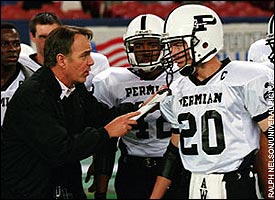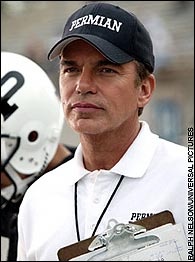| ESPN.com: Page3 |
|
As "Friday Night Lights" his theaters this Friday and the ESPN Book Club debuts on Page 2, ESPN.com takes an in-depth look at the story of Odessa (Texas) Permian High School football: FROM THE ESPN BOOK CLUB: |
 | |
| As Permian coach Gary Gaines, Billy Bob Thornton doesn't yell and scream, but he does get his point across. |
 | |
| Growing up in Arkansas, Thornton learned that prep athletics aren't always kept in the right perspective. |
|
Check out a clip from "Friday Night Lights," Watch Coach Gaines deliver his locker room speech. |